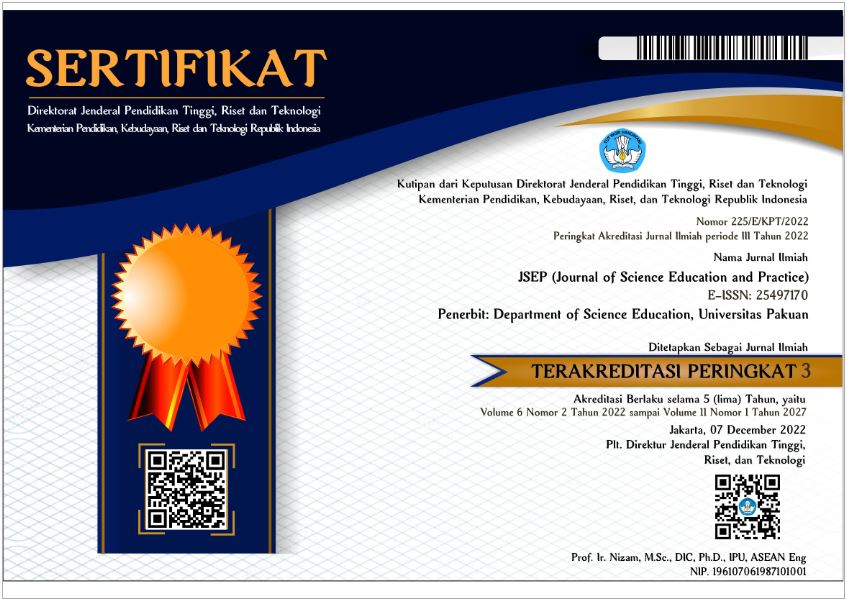ADDITIONAL MENU
Implementation of Stad-cooperative Learning in Improving Social Skills of College Student
Abstract
Keywords
References
Agran, M., Hughes, C., Thoma, C. A., & Scott, L. A. (2016). Employment Social Skills: What Skills Are Really Valued? Career Development and Transition for Exceptional Individuals, 39(2). https://doi.org/https://doi.org/10.1177/2165143414546741
Ahyar, L. M., Ibnu, S., & Affandy, D. (2017). Penerapan Stad Dalam Pembelajaran Inkuiri Terbimbing Dan Pengaruhnya Terhadap Hasil Belajar Peserta Didik. J-PEK (Jurnal Pembelajaran Kimia), 2(1), 2130. https://doi.org/10.17977/um026v2i12017p021
Astawa, I. B. M. (2017). Pengantar Ilmu Sosial. Rajawali Press.
Bali, M. M. E. I. (2017). Model Interaksi Sosial dalam Mengelaborasi Keterampilan Sosial. PEDAGOGIK: Jurnal Pendidikan, 4(2), 211227. https://ejournal.unuja.ac.id/index.php/pedagogik/article/view/19
Bhat, S., Bhat, S., Raju, R., DSouza, R., & Binu, K. G. (2020). Collaborative learning for outcome based engineering education: A lean thinking approach. Procedia Computer Science, 172(2019), 927936. https://doi.org/10.1016/j.procs.2020.05.134
Bremer, C. D., & Smith, J. (2015). Teaching Social Skills. National Center on Secondary Education and Transition, 3(1).
Diahwati, R., & Hanurawan, F. (2016). Keterampilan Sosial Siswa Berkebutuhan Khusus di Sekolah Dasar Inklusi. Jurnal Pendidikan:Teori,Penelitian,Dan Pengembangan, 1, 16121620. https://doi.org/https://doi.org/10.17977/jp.v1i8.6682
Durlak, J. A., Weissberg, R. P., & Pachan, M. (2010). A Meta-Analysis of After-School Programs That Seek to Promote Personal and Social Skills in Children and Adolescents. American Journal of Community Psychology, 45(34), 294309. https://doi.org/10.1007/s10464-010-9300-6
Goodyear, V. A. (2017). Sustained Professional Development on Cooperative Learning: Impact on Six Teachers Practices and Students Learning. Research Quarterly for Exercise and Sport, 88(1), 8394. https://doi.org/10.1080/02701367.2016.1263381
Hasan, S. H. (1996). Pendidikan Ilmu Sosial. Jurusan Sejarah FP IPS IKIP Bandung.
Hosseini, S. M. H. (2019). Cognitive socio-political language learning theory, multiple input-output hypothesis and competitive team-based learning. Theory and Practice in Language Studies, 9(4), 411423. https://doi.org/10.17507/tpls.0904.08
Hu, B. Y., Yuanhua Lia, Chuang Wanga, Huiping Wu, & Ginny Vitiello. (2021). Preschool teachers self-efficacy, classroom process quality, and childrens social skills: A multilevel mediation analysis. Early Childhood Research Quarterly, 55, 242251. https://doi.org/https://doi.org/10.1016/j.ecresq.2020.12.001
Hupp, S. D. A., Monique LeBlanc, Jeremy D. Jewell, & Emily Warnes. (2010). History and overview. Social Behavior and Skills in Children, 121. https://doi.org/10.1007/978-1-4419-0234-4_1
Immordino-Yang, M. H., & Damasio, A. (2011). We Feel, Therefore We Learn: The Relevance of Affective and Social Neuroscience to Education. LEARNing Landscapes, 5(1), 115131. https://doi.org/10.36510/learnland.v5i1.535
Istiqamah. (2019). Pembelajaran Menulis Karangan Deskripsi Dengan Model Kooperatif Tipe Stad. Journal of Chemical Information and Modeling, 53(9), 16891699. https://jurnal.ar-raniry.ac.id/index.php/didaktika/article/view/5034/3301
Loh, R. C.-Y., & Ang, C.-S. (2020). Unravelling Cooperative Learning in Higher Education. Research in Social Sciences and Technology, 5(2), 2239. https://doi.org/10.46303/ressat.05.02.2
Loy, M. L. T., Shahrill, M., Mundia, L., Tengah, K. A., Tan, A., & Mahadi, M. A. (2016). An alternative approach to teaching: Implementing a cooperative learning strategy students team achievement division at the junior college level. Advanced Science Letters, 22(56), 17251729. https://doi.org/10.1166/asl.2016.6748
Lynch, S. A., & Simpson, C. G. (2010). Social Skills: Laying the Foundation for Success. Dimensions of Early Childhood, 38(2), 312. https://search.ebscohost.com/login.aspx?direct=true&db=eric&AN=EJ945679&site=ehost-live%5Cnhttp://www.southernearlychildhood.org/publications.php
McClelland, M. M., & Morrison, F. J. (2003). The emergence of learning-related social skills in preschool children. Early Childhood Research Quarterly, 18(2), 206224. https://doi.org/10.1016/S0885-2006(03)00026-7
Munawar, M. (2019). The application of STAD-Cooperative Learning Model: Efforts to increase motivation and Learning Outcomes of students in Class 5 SD N 07 Ledok Salatiga in Mathematics subjecth in Folding Symmetry and Rotating Symmetry topics. MUDARRISA: Jurnal Kajian Pendidikan Islam, 11(2), 114135. https://doi.org/10.18326/mdr.v11i2.114-135
Mutiani, Bambang Subiyakto, Jumriani, Aslamiah, & Aida Afrina. (2019). Relevansi Modal Sosial dalam Pembelajaran IPS (Studi Kasus Dalam Sistem Zonasi Di SMP Negeri Kota Banjarmasin) (Issue 2).
Putro, H. P. N., Rusmaniah, R., & Mutiani, M. (2022). The Relevance of Social Capital in Efforts to Develop Entrepreneurship Education. Journal of Education and Learning (EduLearn), 16(2).
Putro, H. P. N., Rusmaniah, R., Jumriani, J., Handy, M. R. N., & Mutiani, M. (2021). Business Development Strategies for Micro, Small and Medium Enterprises (UMKM) in Kampung Purun. The Innovation of Social Studies Journal, 3(1), 23. https://doi.org/10.20527/iis.v3i1.3991
Riswan, R., Rajiani, I., Handy, M. R. N., Abbas, E. W., & Rusmaniah, R. (2022). The Role of Economic in Social Studies Education. The Kalimantan Social Studies Journal, 3(2), 144. https://doi.org/10.20527/kss.v3i2.3705
Rodny-Gumede, Y., & Chasi, C. T. (2020). Metaphors of transformation of education and fitness for purpose: Towards a humanizing agenda. South African Journal of Higher Education, 34(1), 213230. https://doi.org/10.20853/34-1-3147
Rusmaniah, R., Mardiani, F., Handy, M. R. N., Putra, M. A. H., & Jumriani, J. (2021). Social Services Based on Institutional for Youth Discontinued School. The Innovation of Social Studies Journal, 2(2), 151. https://doi.org/10.20527/iis.v2i2.3082
Sapriya. (2009). Pendidikan IPS : Konsep dan Pembelajaran. Remaja Rosdakarya.
Scott, C. L. (2015). The Futures of Learning 2: What Kind of Learning for the 21st Century? In UNESCO Education Research and Foresight.
Tran, V. D. (2014). The Effects of Cooperative Learning on the Academic Achievement and Knowledge Retention. International Journal of Higher Education, 3(2), 131140. https://doi.org/10.5430/ijhe.v3n2p131
W. Johnson, D., & T. Johnson, R. (2019). Cooperative Learning: The Foundation for Active Learning. In Active Learning - Beyond the Future. IntechOpen. https://doi.org/10.5772/intechopen.81086
Yuliani, N. (2019). The Role of Student Teams Achievement Divisions (STAD) in Improving Students Learning Outcomes. Classroom Action Research Journal, 3 (1), 815. https://doi.org/10.17977/um013v3i12019p008
DOI: 10.33751/jsep.v6i1.5776
 Abstract views : 415
Abstract views : 415
Refbacks
- There are currently no refbacks.
Copyright (c) 2022 JSEP (Journal of Science Education and Practice)

This work is licensed under a Creative Commons Attribution 4.0 International License.












